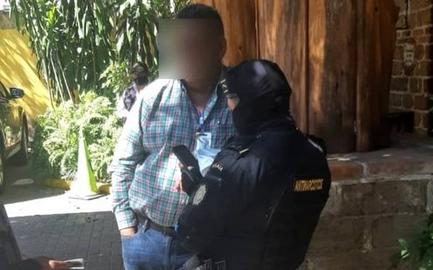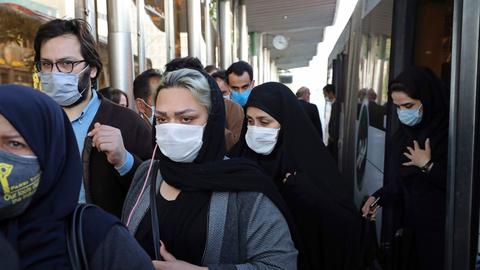Adalberto Fructuoso Comparán Rodríguez was the mayor of the Mexican city of Aguililla, in Michoacán, from 2008 to 2011. In April this year, he was arrested and extradited to the United States a few weeks later, accused of heading up a drug cartel dedicated to trafficking methamphetamine in conjunction with members of Hezbollah.
"Narco-terrorism" is the broad term for drug trafficking activity that generates economic funds for - or otherwise benefits - terrorist organisations like Hezbollah. It mainly refers to the illegal cocaine trade. The Tri-Border area between Argentina, Paraguay and Brazil is one of the hottest spots in the world for narco-terrorism, but the same outfits are also deepening their ties with Mexico.
The fact that a Mexican ex-mayor is now wanted in connection with narco-terrorism for Hezbollah, rightly or not, is an indication of just how pervasive the group’s influence has become in Mexico. Comparán Rodríguez, nicknamed “El Fruto”, was specifically accused of leading a group called the Unidos Cartel, which smuggled methamphetamine across the border from Mexico to the United States. The authorities also arrested his 31-year-old son, Adalberto Fructuoso Comparán Bedolla, who is accused of being the organization’s second-in-command.
According to a statement issued by the US government, in January 2021, "El Fruto" held a meeting in Cali, Colombia with a person identified only as a "money launderer" for Hezbollah. Alfonso Rustrian, a now-detained drug lord, also participated in the meeting. According to the US authorities both drug leaders confirmed to the Hezbollah member that they could supply hundreds of kilograms of methamphetamine if required.
A shipment of 500 kilograms was duly agreed on, and dispatched over the border and via Texas to Miami, Florida. The traffickers hid some of the consignment inside concrete slabs, which were packed into a truck. The rest, about 300kg, was transported dissolved in buckets of paint.
In April, along with the Guatemalan police, intelligence agents managed to identify and locate “El Fruto”, his son and his partner inside Mexico. Simultaneously in Miami, the US authorities arrested four more people who had facilitated the deal. In the course of the arrests they located a drugs factory and seized a fresh quantity of methamphetamine.
The US Department of Justice did not provide any further details about alleged links between "El Fruto" and Hezbollah, save for mentioning that the suspected money-launderer was the businessman Carlos Basauri Coto. The money, according to the DoJ, passed through the balance sheets of two of his own companies, and was physically transported by private jet. Just hours before his arrest, Basauri Coto was said to have accepted a suitcase full of cash for his financial services.
Hezbollah in Mexico
The Iranian regime's attempts to gain a footing in Latin America date back to the 1980s, shortly after the 1979 Islamic Revolution. IranWire has already mentioned in previous articles how Iranian clerics have concealed their true intentions to export regime ideology behind pseudo-cultural or religious activities. Iran’s inroads in South America have also paved the way for Hezbollah to nest and expand its terror-financing activities, while recruiting sympathizers in various different countries.
Mexico was one of the last countries in Latin America where Hezbollah managed to get a foothold. Hezbollah’s presence in Mexico was observed for the first time in 2001, after a man named Mahmoud Yousef Kourani was arrested for having brought more than 300 Lebanese citizens into the US illegally. Kourani lived in California, and claimed to be a carpenter, but behind the facade was also involved in raising illicit cash for Hezbollah. The US accuses him of having collected $40,000 destined for the terrorist organisation.
The journalist Raymundo Riva Palacio has explained in an article for El Financiero newspaper that the Mexican government has minimized Hezbollah’s presence - with good reason. “Court documents in the United States have shown that Hezbollah financed some of its military activities with money from [drug cartel] Los Zetas, and, through those ties, the Sinaloa Cartel sent cadres to Iran to train in the preparation of car bombs, which began to be used in 2008.”
The Mexican government did little if anything to prevent this. Nor did it intervene in 2011, when the US Drug Enforcement Administration (DEA) accused Ayman Joumaa, a Colombian-Lebanese citizen, of facilitating large shipments of cocaine to the US and laundering money for "numerous" drug trafficking organisations, including Los Zetas. About $850 million from Los Zetas was laundered at the Lebanese Canadian Bank, several of whose executives and subsidiaries are linked to Hezbollah. Joumaa, according to the indictment, received two to four million dollars in Mexico City from Los Zetas and sent them to Hezbollah in return for commission.
In 2012, after yet another alert from the US, Mexican police arrested three people in the Yucatán region suspected of establishing a local Hezbollah cell. Among them was Rafic Mohammad Labboun Allaboun, who had previously been imprisoned in the US for wire fraud linked to Hezbollah.
Los Zetas and Hezbollah
Los Zetas is a vast Mexican criminal syndicate that has historically been one of the most powerful drug cartels in the country, as well as the most violent. In a piece of research on the group for the University of Texas, scholar Daniel Valencia asserts that the cartel is closely associated with several terrorist and Islamic fundamentalist groups, including Hezbollah.
“This deadly alliance between a crime syndicate and a terrorist organization is alarming due to the proximity of the operations and the resource capabilities of both entities,” Valencia writes. “Hezbollah and Iran have been concentrating on developing a presence in Latin America for the past nine years. The focus was on forming relationships with Mexican drug cartels and establishing a residence with the aid of the cartels. The Mexican cartels have gained a dangerous ally by sympathizing with Hezbollah’s cause.”
Drug trafficking generates millions of dollars each year, which makes it attractive for many criminal organizations that need dirty money to finance their illicit activities. Hezbollah, Valencia writes, is no the exception.
The scholar adds: “The threat of an attack by Hezbollah against the United States has always been present. It has only become more realistic in these last ten years due to their spread of activity and influence in Latin America and Mexico. Their criminal activities and alliances with drug trafficking organizations such as Los Zetas illustrates a growing and dormant threat south of the border.”
The journalist Raymundo Riva Palacio has also warned that in Mexico the authorities are turning a blind eye to this criminal activity. "Colombia and the US have long investigated Hezbollah's infiltration of gangs associated with drug trafficking,” he writes, “while drug trafficking routes in Mexico remain intact. Outside are the red traffic lights. Here, we prefer not to take notice."
Related coverage:
Tehran and Caracas Cosy Up at UN with New Sanctions-Defying Oil Deal
Hezbollah Supporters Running Kids’ Scouting Groups in Brazil
The Peruvian President-Elect's Ties to Pro-Islamic Republic Recruiters
The Holocaust-Denying Cleric Bolstering Hezbollah in Argentina
Tareck El Aissami: Hezbollah’s Biggest Benefactor in Venezuela
Pirates of the Caribbean: The Dangerous Relationship Between Venezuela, Iran and Hezbollah
Business or Terror? Key Figures Denounce Iran's Incursions in Venezuela
Venezuela's Clans Usher Hezbollah in Through the Front Door
Tip of the Iceberg: Hezbollah’s Narco-Terrorism in Latin America Exposed
visit the accountability section
In this section of Iran Wire, you can contact the officials and launch your campaign for various problems



























comments